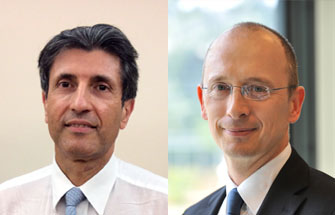The international auditing and consulting firm PwC (PricewaterhouseCoopers) has chosen Monaco as one of the 157 countries where its network has permanent teams. We met Claude Palmero and Frank Vanhal, two of the firm’s partners.
Why did PwC set up in Monaco?
F Vanhal: Monaco is an internationally renowned financial centre. The Principality has many local and international businesses, some of which are listed on the stock exchange. Given the standing of activity of Monaco’s banks and businesses, as well as their growing links with groups established abroad, it was natural for the international firms to gradually expand their presence here. PwC was the first to take the step of setting up in Monaco by approaching prominent organisations active in Monaco for a long period, namely those of Claude Palmero and Claude Tomatis.
C Palmero: In 1959, my father André Palmero founded the family accounting firm which I then developed. I had acquired solid experience in auditing, organisation, mergers & acquisitions and valuation at Arthur Andersen. In 2010, my firm managed over a dozen banks for audit and statutory accounting assignments. One team (5 people out of 23) was entirely dedicated to that area. The technical nature of the profession has become increasingly important: international auditing standards, IFRS accounting principles, Basel 1, 2, 3, and the European Market and Infrastructure directives etc. PwC provides major, recognized technical support as the network is particularly specialised in the international banking regulations and serves many large banking groups. This contribution is very important for the quality of service provided to our customers, given the increasing internationalisation of their activities. In 2010, I approached PwC, believing that joining this network would strengthen our expertise, including in the banking sector. PwC was already present in Monaco through my colleague Claude Tomatis who had founded his firm in 1970.
How are you organised?
F Vanhal: In Monaco our firm has over 60 employees of 8 different nationalities, including Monegasques, French, Belgians, Canadians, Russians, Colombians and Ivorians. They come from different training backgrounds - business schools, chartered accountants, tax or legal experts.
The legal and tax consulting business comprises 7 people and is a specific branch of the firm. Thanks to our critical mass and our network, we have the human and technical resources to assist Monaco-based banks and companies in all their projects and to advise them in highly technical areas, locally or internationally. We are a full member firm of the PwC network. It should be remembered that worldwide PwC means 195,000 people in 157 countries.
What support do you provide?
C. Palmero: We are a multidisciplinary firm, we assist our clients in auditing, accountancy, legal and tax advice, transaction consulting, organisational consulting, management and digital transformation.
We are leaders in Monaco, particularly in the banking and financial sector. Our particular setup comprising recognised experts in Monaco, plus the contribution of our international network, ideally allows us to work with banks and asset management companies at two levels - local law and international issues. This allows us to foresee changes in the regulations better, for example.
Our contacts in the financial sector are bank managers, finance managers, internal control, compliance, and asset managers, legal executives. We work with these sector professionals regularly to assist them in complex cases, during audits or consultancy.
F Vanhal: We also contribute actively to disseminating knowledge of the Monaco financial centre in partnership with the AMAF, for example through our "Approval of Accounts" annual conferences for banks and businesses, as well as our annual IT security survey.
What do you think of the evolution of your profession?
F. Vanhal: It is linked to that of the financial centre.
The work has become more sophisticated and professionalized. In private banking, Monaco is quite ahead of other European countries, as the importance of private banks is its specificity.
With the banks, the concentration process is underway. The critical deposit threshold to amortize a bank’s costs is now over one billion euro, with the exception of niche banks highly specialised in a specific geographical area or customer segment. Banks have economies of scale and are transforming their IT systems. Many general banks are divesting from private banking. A new fiscal paradigm is creating new challenges. Asset management companies are players with favourable opportunities for their activity here. They will continue to increase in number if Monaco is attractive.
C. Palmero: Overall, in banking, the future is opening with great opportunities - Monaco is highly rated by the regulatory bodies. Moreover, the OECD rates Monaco in the same category as the US and Germany.
People who settle in Monaco bring business and part of their wealth here. The challenge for the next decade is to bring in working people in their forties or fifties, with their families. We have many advantages: the tax system is clear - 75% of state revenues are from taxes, particularly VAT and stamp duty - the country is safe and its quality of life very high. The network of bank customers is very large, and for Monegasque banks this requires very specific expertise and industrialisation of these skills. The future of financial activities in Monaco lies in onshore business, local business.
In the 80s, the financial centre accounted for billions of francs, while almost all the banks were branches of French institutions. In the 90s and 2000, the French bank branches become Monegasque companies or branches of foreign banks, and new players arrived. Deposits now stand at 108 billion euro. Progress is very important.
We have endeavoured to support the financial centre’s positive and controlled evolution. Our role, like that of other professional services players, must be to contribute to the financial centre’s attractiveness and promote the development of Monaco’s banks and businesses.






